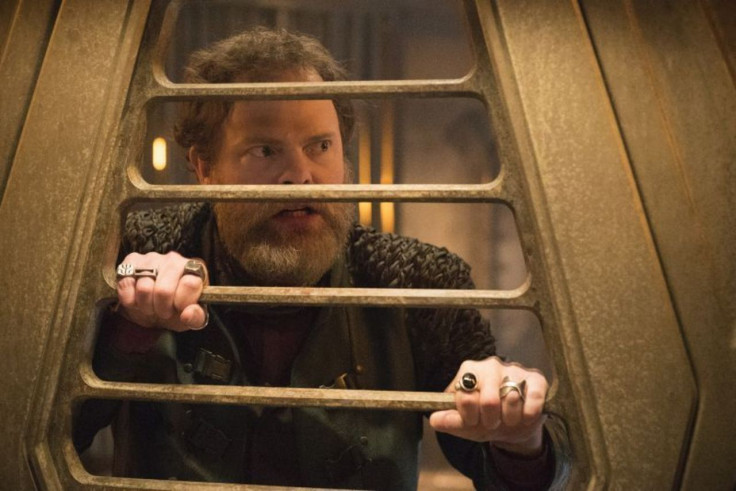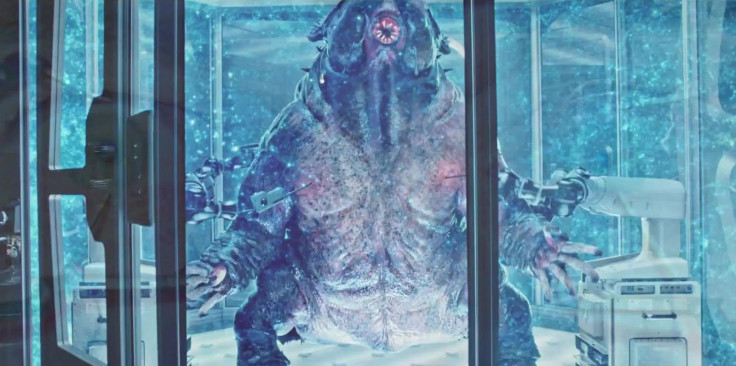Starfleet built a spore-powered warp drive that works by torturing an animal. Even more awful, by the beginning of Star Trek: Discovery Episode 5, “Choose Your Pain,” it’s become a vital part of the war effort. The torture drive is one of the more outrageous narrative choices made on Star Trek: Discovery so far, but in the series’ fifth episode, “Choose Your Pain,” the tardigrade’s story ends with a fizzle — the first indication that Discovery’s big experiment, complete serialization, may never pay out enough to outweigh the heavy narrative cost.
In most ways, “Choose Your Pain” is better than last week’s clumsy “The Butcher’s Knife Cares Not for the Lamb’s Cry.” The characters are starting to come into their own. With well-drawn distinctions and conflicts, the script is marginally better and no one does anything as stupid as Commander Ellen Landry.
“Choose Your Pain” opens with Michael Burnham (Sonequa Martin-Green) looking to convince the Discovery’s crew that their use of the spore drive is hurting the tardigrade (whose mycelial DNA is necessary for navigation). Many onboard are easily convinced — maybe the damn thing’s screams of agony were their first clue — but it’s Saru, left in charge while Captain Lorca meets with the Starfleet admirals, that Burnham must convince. Saru, already suspicious of any move Burnham makes onboard (threat ganglia on alert), has additional incentive to ignore the tardigrade’s pain when Lorca’s shuttle is captured by Klingons. Only the spore drive equipped Discovery, complete with its tardigrade torture chamber, can make the jump behind enemy lines. The choice for Saru is easy: let’s save Lorca first and worry about theoretical tardigrade agony later.
Consistently one of the strongest relationships in the show, the Burnham vs. Saru conflict works really well here too. And it makes sense that Saru, operating from the bridge, wouldn’t see the effects the spore drive has on the tardigrade. So does his anger at Burnham’s duplicity and condescending suggestion that his species’ characteristics have impaired his judgment on the issue.
Unfortunately, Discovery takes the easy way out of the conflict. The tardigrade shrivels and curls into a useless ball — a convenient “cryptobiosis” that requires finding another solution without having to make any hard decisions. A workaround is discovered in time to save Lorca and the tardigrade is set free to continue exploring the universe all by its lonesome. Saru and Starfleet eventually did the right thing, but the decision doesn’t feel so agonizing when the solution comes so easily.
In its totality, the tardigrade dilemma sprawled over three episodes with an ethical question that anyone in Starfleet could answer — don’t torture animals. Wrapped in a neat bow by the end of “Choose Your Pain,” it’s hard to see why it was worth all the effort. It’s not that the tardigrade was a bad idea — it’s one of the more inventive Star Trek aliens — but what did the serialized spread do for it?
If the tardigrade demonstrates that seriality doesn’t automatically win our investment with familiarity, the other half of “Choose Your Pain” shows the perils of having it both ways — it’s the worst example of Star Trek: Discovery’s desire to shoehorn an episodic plot with its serial narrative yet.
After Admiral Katrina Cornwell (Jayne Brook) orders Lorca to hold the Discovery back from the front lines — "We need more tardigrades... there's concern at the highest level of leadership, about taxing our prime asset," she says, unaware Burnham and Stamets will soon nullify that concern — Lorca’s shuttle gets captured by Klingons.
Lorca will soon escape Klingon captivity with Lieutenant Ash Tyler (Shazad Latif), a Klingon prisoner for the entire seven months since the Battle of the Binary Star from Episode 2. Lorca is skeptical anyone could survive seven months of Klingon torture, but Tyler hints that his life has been spared so the captain of the Klingon ship could sexually assault him ("The captain on this ship, she's taken a liking to me"). We don’t learn much more, as any elaboration on Tyler’s backstory is left to later episodes. For now Tyler is a nub, whether for further characterization, or, more likely, a late season plot twist — remember L’Rell telling Voq he’ll have to sacrifice everything and embrace the spy tricks of the House Mokai?
Whereas Tyler’s introduction feels cut to near nothing, Lorca spends plenty of time getting to know his other cellmate: Harcourt Fenton Mudd (Rainn Wilson), a minor-league scam artist who avoids torture by hook or by crook, feeding information to their Klingon captors, stealing food and generally acting snide and contemptible.
Harry Mudd is one of the weirder Star Trek: The Original Series connections Discovery has chosen to make. In his two original Star Trek episodes, Mudd rules over a planet of sexbots and pimped out women to a mining colony. Like a cartoon wolf with his tongue flopping out, Mudd is a relic of 60s sex farce jokes that are deeply creepy and predatory in a modern context.
Here, in Star Trek: Discovery, he’s something altogether different, though it’s hard to say what exactly. “Choose Your Pain” really wants to take Mudd in a darker direction without losing his flamboyant, verbose hokiness. He’s still a lothario — his troubles began when he took loan shark money to buy a moon for the object of his affection — but also has some sort of common man critique of Starfleet, accusing them of arrogance in their dealings with the Klingons. When Lorca protests that Starfleet didn’t start this war, Mudd busts out a real thudder: “Of course you did, the moment you decided to boldly go where no one had gone before.”
Just like Tyler, Mudd doesn’t actually do anything in “Choose Your Pain." That wouldn’t be sufficiently serial. Instead, he swings wildly between pseudo-Shakespearean grandiosity and an affected, unconvincing menace. This is literally his last line: "You haven't seen the last of Harcourt Fenton Mudd!”

But despite not really liking either the conclusion of the tardigrade plot or Lorca’s truncated mini-vacation aboard a Klingon prison ship, “Choose Your Pain” is a positive step for Discovery. The collaborative relationship between Burnham, Stamets and Tilly finally demonstrates some ensemble chemistry. Watching them work together on a problem, spinning off potential solutions, like building a virtual Ripper inside the ship’s computers, is more electrifying than watching Geordi La Forge talk to himself.
One of the best character moments comes when Saru, hoping to restore his confidence after Burnham destroyed his chill, runs a self-help protocol from the captain’s ready room. First, he asks the computer to collate the various personality traits of great captains (it’s a little silly that it’s only captains we’ve heard of: Robert April, Jonathan Archer, Matt Decker, Christopher Pike and Philippa Georgiou). Saru is looking for an answer that will empower his personality, but the computer finds a more efficient path. “Alternative solution: eliminate destructive element.” Sorry, Burnham. Not only is this a wry character moment for Saru, it’s also a fun application of sci-fi, as Saru asks more of a computer than we ever could, but gets back a far future equivalent of our exasperating interactions with tech.
“Choose Your Pain” ends with Stamets and Dr. Culber brushing their teeth together and discussing the day’s dangers. It’s a romantic and quiet moment, maybe the first good one Discovery has offered. And it ends on a sinister note — a horror movie moment with Stamets at his bathroom mirror — that probably points to an upcoming Mirror Universe episode. The plot material of “Choose Your Pain,” both episodic and serial, disappoints, but it puts the characters on a good enough footing that I look forward to a plot worthy of Star Trek: Discovery’s deepening ensemble.
- Richly redesigned Klingons
- Complex and explicable motives
- Great new Starfleet characters
- Incredible production design
- Generic space combat and action
- Too many flashbacks
- Eschews subtext, doesn't put enough faith in the audience





![Best Gaming Mouse For Gamers With Smaller Hands [2025]](https://d.player.one/en/full/227430/best-gaming-mouse-gamers-smaller-hands-2025.png?w=380&h=275&f=fdcf47c1c5fc58d1e41d3be505c12568)













